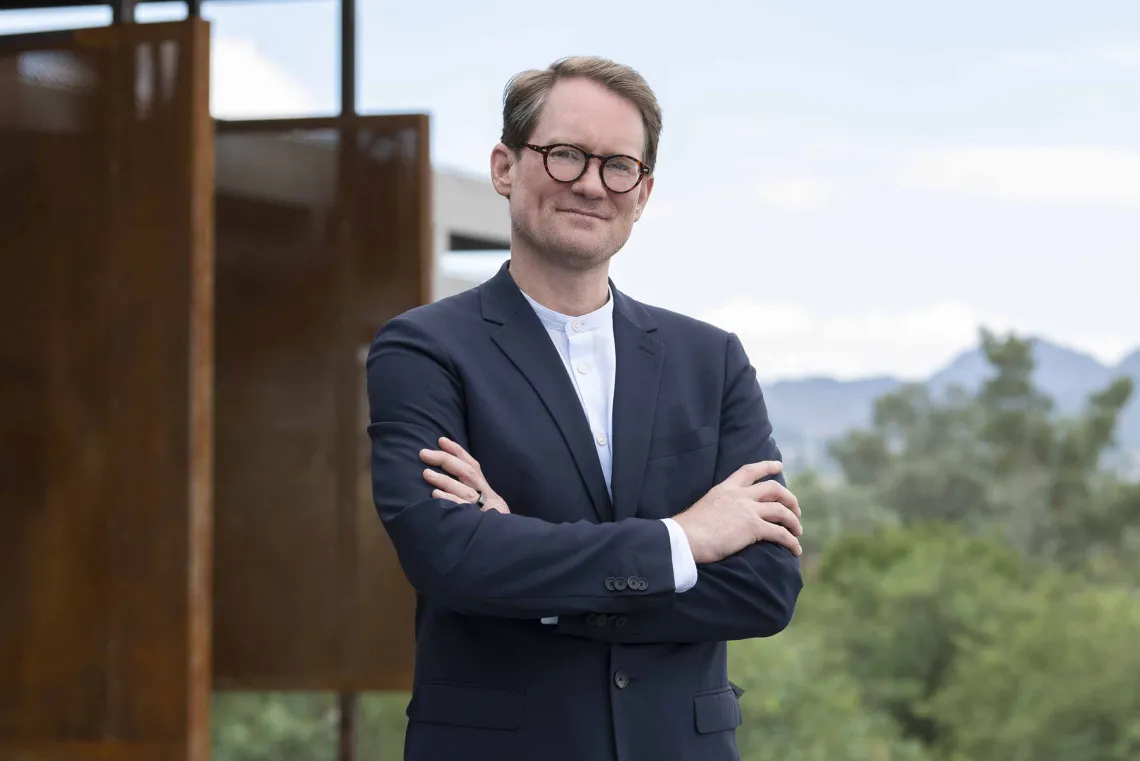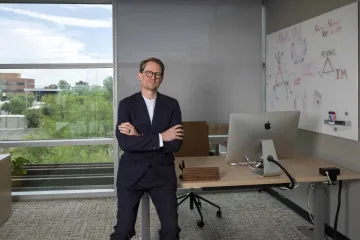Connecting with Stephen Dahmer, MD
Director of the Andrew Weil Center for Integrative Medicine wants to bring integrative medicine to the entire state as the first step toward well-being.

Stephen Dahmer, MD, the director of the Andrew Weil Center for Integrative Medicine, says the center can be a leader in transforming health care in the 21st century.
Photo by Noelle Haro-Gomez, U of A Health Sciences Office of Communications
Stephen Dahmer, MD, became director of the Andrew Weil Center for Integrative Medicine in December.
Previously an assistant clinical professor in the Department of Family and Community Health at the Icahn School of Medicine at Mount Sinai in New York City, Dahmer led the grand opening of the center’s new space in April.
The past few months have been a time of change and adjustment, from the establishment of the new center space to plans for expanded research and, of course, getting used to Arizona’s weather.
Health Sciences Connect recently caught up with Dahmer, who is also a member of the Comprehensive Center for Pain & Addiction, to discuss his plans for the center and more.
What was it about the Andrew Weil Center for Integrative Medicine that initially interested you?
As the new director, I’m not just taking on a role; I’m amplifying a lifelong journey. My own life centers on the principles of integrative medicine. Throughout my career, integrative medicine has served as the backbone for my care of patients. My own drive is focused on ensuring that integrative medicine becomes the essential first step in everyone’s health care journey.
What will you focus on in this first year?

Stephen Dahmer, MD, director of the Andrew Weil Center for Integrative Medicine
Photo by Noelle Haro-Gomez, U of A Health Sciences Office of Communications
Through our programs, the center has reached the milestone of training over 5,000 physicians and health-care professionals worldwide in the principles and practice of integrative medicine, aiming to transform the future of health care. As we move forward, we continue to expand, improve, and refine this core work, ensuring that our training programs remain at the forefront of integrative medicine and effectively meet the evolving needs of health-care practitioners and their patients. In addition, we are looking to establish a brick-and-mortar clinic on the corner of Sunrise and Kolb in Tucson with the support of Banner Health that will serve to further support our education initiatives. We also hope to continue to expand on our pioneering research. Finally, we are already booking events in our brand-new home, a three-building complex designed to foster collaboration and research in the field of integrative medicine.
What are your long-term goals for the center?
As an organization, AWCIM creates goals together. We are in the process of strategic planning to solidify those goals. There are more details to come, but I can share that they center on education, research, patient care and how our efforts in these areas will lead to the transformation of health care by training a new generation of health professionals and by empowering individuals and communities to optimize health and well-being through evidence-based, sustainable, integrative approaches. Integrative medicine is the most promising means by which we can realistically achieve the” quintuple aim” in health care. The “quintuple aim” expands health-care goals to improve population health, enhance patient experience, reduce costs, support health-care worker well-being and advance health equity. Integrative medicine's comprehensive, patient-centered approach will contribute to achieving these aims by addressing the interconnected physical, menta, and social factors that influence health outcomes across diverse populations.
There are other integrative medicine units within the U of A Health Sciences. How will you work together?
Integrative medicine thrives on collaboration, and we have a rich history of working together across the U of A Health Sciences. As the director, I’m fortunate to build on that foundation and those connections, and I’m always eager to explore new opportunities. We have key colleagues in most major specialties: Integrative Rheumatology, Integrative Psychiatry, Integrative Oncology, Integrative Allergy and Immunology, Integrative Pain Care and Integrative Cardiology, just to name a few! Another remarkable example is Ray Runyon, PhD, our assistant director of the AWCIM research program, who co-leads the multidisciplinary Non-Invasive Technology Core for the $60 million NIH Precision Aging Network Program. At the annual NIH site visit for the PAN in June 2024 Dr. Runyon, along with colleagues Mattias Mehl, PhD, a professor of psychology in the College of Science, and Bijan Najafi, PhD, an associate professor of surgery in the College of Medicine – Tucson, showcased how simple, non-invasive tests like sweat analysis, voice recordings and video observations could potentially predict healthy aging and frailty, supporting a more holistic approach to understanding and promoting wellness in older adults.
How will the center bring integrative medicine to the wider state of Arizona?
This is near and dear to my own personal mission. I have worked around the globe in diverse communities and am grateful for all they have taught me. I even worked here in Arizona as a hospitalist in Chinle many moons ago. I held a previous position that offered asynchronous and virtual care across the state of Texas. I know there is tremendous potential via similar mechanisms to lower barriers to access through these same remarkable technological tools. Circling back the quintuple aim, integrative medicine is extremely cost effective. This is one of many ideas we are working on implementing to ensure that integrative medicine becomes the essential first step in everyone’s health care journey, whether you are in Chinle or New York.
The center offers programs in wellness, lifestyle, aromatherapy, integrative environmental health, Ayurveda and other Eastern practices. What do you tell skeptics about these ancient practices being included at a research-focused medical campus?
I learned long ago to let our work speak for itself. Our doors are always open to those interested in understanding how integrative medicine, grounded in evidence, benefits both patients and practitioners alike. At its core, integrative medicine combines the most well-researched conventional medicine with the most well-researched, evidence-based complementary therapies to achieve the appropriate care for each person.
How has the research around those health care practices changed?
The research continues to move forward at a remarkable rate, solidifying our work and increasing the number of those within the health care system who are proud of the new approach and tools integrative medicine offers to those of us on the front lines, both for our own self-care and the care of our patients. Rocky Crocker, MD, and our team published findings from the IMPACT trial conducted at the University of Arizona Integrative Health Center in Phoenix. The study demonstrated the positive effects of integrative primary care, with patients reporting significant improvements in physical, mental, and emotional well-being, along with reductions in pain and fatigue.
What has been the most surprising thing about your move to the University of Arizona?
I’m amazed at how much we talk about the weather in Tucson. I’ve jumped right on board. My family back in Wisconsin has even commented on my newfound interest in the weather!
If you could talk to yourself at your medical school orientation, what advice would you share?
Medical school can be stressful, so prioritize self-care. Build strong relationships. Work on your communication skills. Exercise sound judgment and discretion in how you handle and evaluate all new information. Have some fun.

